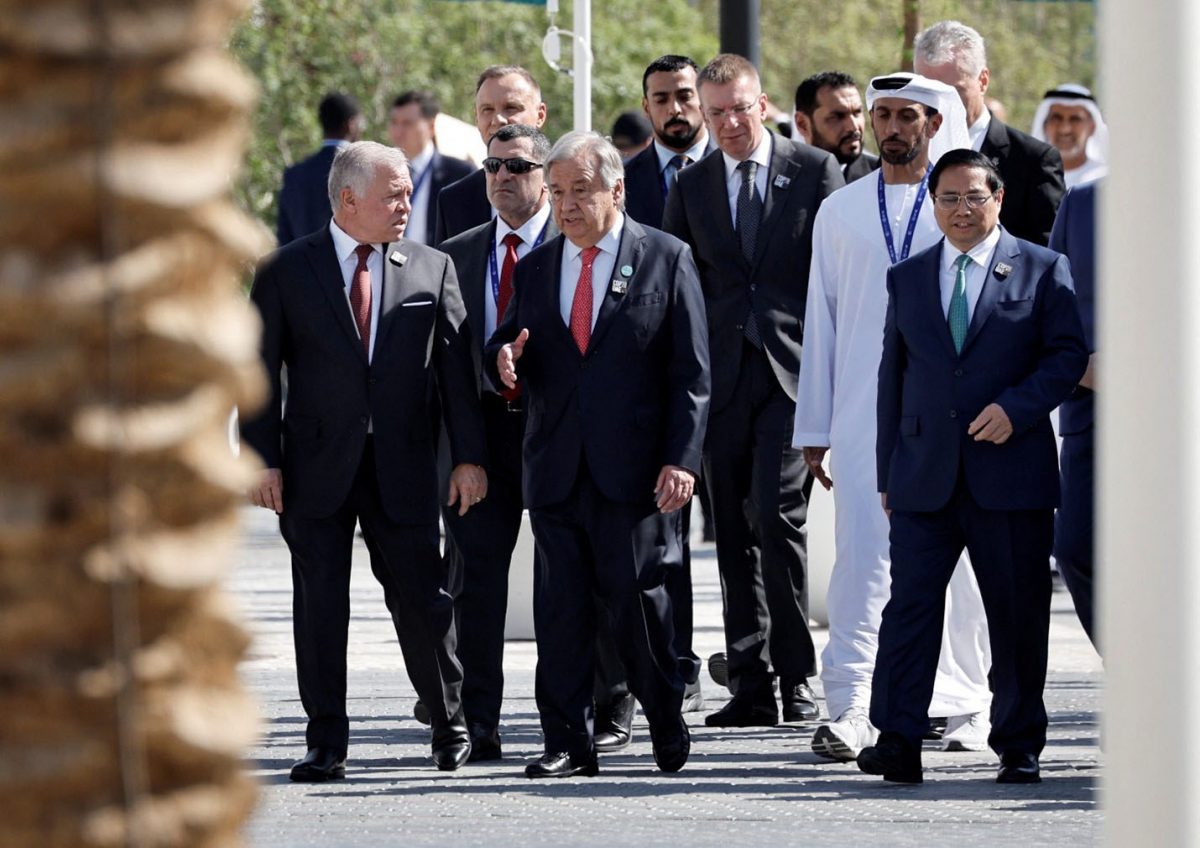DUBAI, (Reuters) – U.N. Secretary General Antonio Guterres urged world leaders at the COP28 climate summit yesterday to plan for a future without fossil fuels, saying there was no other way to curb global warming.
Speaking a day after COP28 president Sultan Ahmed al-Jaber proposed embracing the continued use of fossil fuels, Guterres said: “We cannot save a burning planet with a fire hose of fossil fuels.”
“The 1.5-degree limit is only possible if we ultimately stop burning all fossil fuels. Not reduce. Not abate,” he said, referring to nascent technologies to capture and store carbon emissions.
The competing visions summed up the difficulty of this year’s U.N. climate summit in the oil-producing United Arab Emirates, where divisions over fossil fuel, acrimony over lagging finance and geopolitical tensions around the war in Gaza threatened to distract delegates from making progress.
King Charles III of Britain pleaded with world leaders to make progress in the global climate agenda.
“Scientists have been warning for so long, we are seeing alarming tipping points being reached,” he said.
“Unless we rapidly repair and restore nature’s economy, based on harmony and balance, which is our ultimate sustainer, our own economy and survivability will be imperilled,” said the king, who has spent most of his adult life campaigning on the environment.
The comments from Charles appeared to be at odds with his government’s. British Prime Minister Rishi Sunak, who announced 1.6 billion pounds ($2.02 billion) in climate finance, has rolled back several domestic measures set by previous governments to help the country meet its 2050 net-zero targets.
Indian Prime Minister Narendra Modi appeared to admonish wealthy countries for their role in releasing the most climate-warming emissions since the Industrial Revolution.
“We do not have much time to correct the mistakes of the last century,” Modi said. “Over the past century, a small section of humanity has indiscriminately exploited nature. However, entire humanity is paying the price for this, especially people living in the global south.”
A former Marshall Islands president, whose country faces inundation from climate-driven sea level rise, resigned from the main COP28 advisory board on Friday in protest at the UAE’s support of continued use of fossil fuels.
Hilda Heine said in her resignation letter that she was “deeply disappointed” that the UAE had reportedly used its COP28 role to broker oil and gas deals. The UAE has strongly denied the accusations.
The UAE’s COP28 presidency said it was “extremely disappointed” by Heine’s resignation. “We have been completely clear, open, and honest throughout this process,” the statement said.
Away from the main stage, delegations and technical committees set to work on Friday on the mammoth task of assessing their progress in meeting global climate targets, specifically the Paris Agreement goal of limiting global warming to within 2 degrees Celsius (3.6 degrees Fahrenheit), above pre-industrial temperatures.
Scientists say that a global temperature rise beyond this threshold will unleash catastrophic and irreversible impacts worldwide.
The United Nations on Friday published its first draft for what could serve as a template for a final agreement from the COP28 summit, which ends Dec. 12.
The draft offers “building blocks” for a political outcome and includes several options to address the central problem of whether, and to what extent, fossil fuels should play a role in the future.
One of the options involves including commitments to either “phase down” or “phase out” the use of fossil fuels, to quit coal energy and to triple renewable energy capacity by 2030.
Also on the table for discussion is whether to phase out fossil fuel subsidies, which totalled some $7 trillion globally last year, and whether to include provisions for carbon capture and removal technology.



